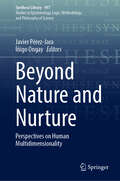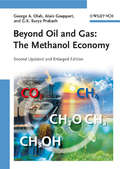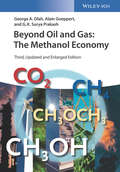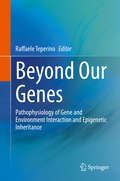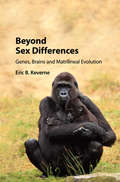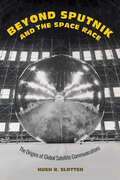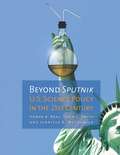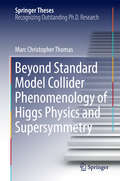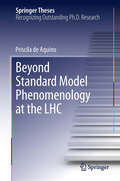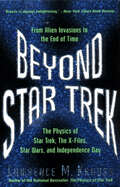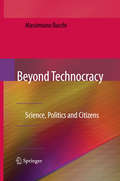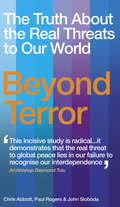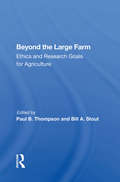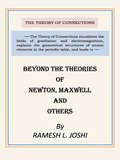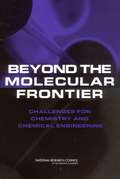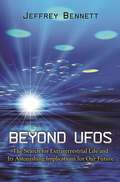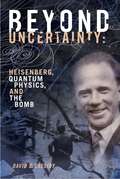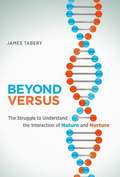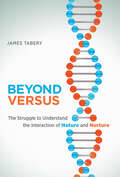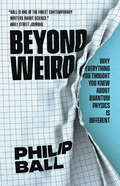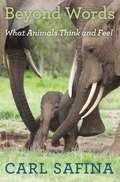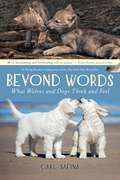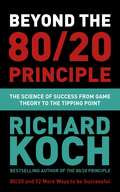- Table View
- List View
Beyond Nature and Nurture: Perspectives on Human Multidimensionality (Synthese Library #497)
by Javier Pérez-Jara Íñigo OngayThis book gathers several of the world&’s leading scholars in the nature vs. nurture debate, offering a timely reconsideration of the dynamic interactions between physical, chemical, biological, social, and cultural factors that shape human multidimensionality. Emphasizing this multidimensionality, this edited volume seeks to bridge the divide between biology and social theory—two research communities that have too often overlooked each other. These disciplines, despite being central to understanding human nature, have long operated in isolation. While some animal species exhibit higher degrees of phenotypic plasticity in specific traits, humans stand out as the most plastic species in both their neurological and sociocultural systems. This plasticity leads the contributors of this book to move beyond both biological reductionism and the blank-slate hypothesis. While biology undoubtedly plays a role in shaping and stabilizing human social and cultural processes, it does so only within the framework of an inherently social environment—one shaped by historically contingent and socially constructed realities, such as values, codes, and cultural perceptions. More importantly, cultural structures and social interactions actively shape and transform certain biological features that were once considered immutable. This book lays the groundwork for a productive dialogue among biologists, psychologists, social theorists, and philosophers. It also highlights some of the moral and political consequences of different perspectives within the nature vs. nurture debate. Through updated scientific and philosophical theorizing, the chapters in this book aim to overcome, once and for all, the simplistic yet persistent opposition between nature and nurture, offering a far more complex and dynamic—yet richer and epistemologically manageable—picture of the human being.
Beyond Oil and Gas
by George A. Olah G. K. Prakash Alain GoeppertThe world is currently consuming about 85 million barrels of oil a day, and about two-thirds as much natural gas equivalent, both derived from non-renewable natural sources. In the foreseeable future, our energy needs will come from any available alternate source. Methanol is one such viable alternative, and also offers a convenient solution for efficient energy storage on a large scale.In this updated and enlarged edition, renowned chemists discuss in a clear and readily accessible manner the pros and cons of humankind's current main energy sources, while providing new ways to overcome obstacles.Following an introduction, the authors look at the interrelationship of fuels and energy, and at the extent of our non-renewable fossil fuels. They also discuss the hydrogen economy and its significant shortcomings. The main focus is on the conversion of CO2 from industrial as well as natural sources into liquid methanol and related DME, a diesel fuel substitute that can replace LNG and LPG. The book is rounded off with an optimistic look at future possibilities. A forward-looking and inspiring work that vividly illustrates potential solutions to our energy and environmental problems.
Beyond Oil and Gas: The Methanol Economy
by George A. Olah G. K. Prakash Alain GoeppertCompletely revised and updated, the third edition of this bestseller discusses the concept and ongoing development of using methanol as a transportation fuel, energy storage medium, and as a raw material to replace oil. The contents have been expanded by 35% with new chapters on energy storage, methanol from biomass and waste products, as well as on carbon dioxide recycling. Written by the late Nobel laureate George Olah and his team, this is an inspiring read for anyone concerned with the major challenge posed by tomorrow's energy and environmental problems.
Beyond Oil and Gas: The Methanol Economy
by George A. Olah Alain Goeppert G. K. PrakashThe world is currently consuming about 85 million barrels of oil a day, and about two-thirds as much natural gas equivalent, both derived from non-renewable natural sources. In the foreseeable future, our energy needs will come from any available alternate source. Methanol is one such viable alternative, and also offers a convenient solution for efficient energy storage on a large scale.In this updated and enlarged edition, renowned chemists discuss in a clear and readily accessible manner the pros and cons of humankind's current main energy sources, while providing new ways to overcome obstacles.Following an introduction, the authors look at the interrelationship of fuels and energy, and at the extent of our non-renewable fossil fuels. They also discuss the hydrogen economy and its significant shortcomings. The main focus is on the conversion of CO2 from industrial as well as natural sources into liquid methanol and related DME, a diesel fuel substitute that can replace LNG and LPG. The book is rounded off with an optimistic look at future possibilities. A forward-looking and inspiring work that vividly illustrates potential solutions to our energy and environmental problems.
Beyond Our Genes: Pathophysiology of Gene and Environment Interaction and Epigenetic Inheritance
by Raffaele TeperinoThe genotype/phenotype dichotomy is being slowly replaced by a more complex relationship whereby the majority of phenotypes arise from interactions between one’s genotype and the environment in which one lives. Interestingly, it seems that not only our lives, but also our ancestors’ lives, determine how we look.This newly recognized form of inheritance is known as (epi)genetic, as it involves an additional layer of information on top of the one encoded by the genes. Its discovery has constituted one of the biggest paradigm shifts in biology in recent years. Understanding epigenetic factors may help explain the pathogenesis of several complex human diseases (such as diabetes, obesity and cancer) and provide alternative paths for disease prevention, management and therapy. This book introduces the reader to the importance of the environment for our own health and the health of our descendants, sheds light on the current knowledge on epigenetic inheritance and opens a window to future developments in the field.
Beyond Sex Differences: Genes, Brains and Matrilineal Evolution
by Keverne Eric B.Recent developments in behavioural neuroscience and genomics are providing exciting new tools for understanding mammalian evolution. Drawing on a range of disciplines including genomic reprogramming, immunology, genomic imprinting, placentation and brain development, this book examines the leading role played by the mother's genome and epigenome in the successful evolutionary progression of humans from ancestral mammals. Keverne begins by discussing the historic context of the perceived dominance of males and the patriline, before arguing that it is instead the matriline that exerts the dominant influence in shaping the evolution of our brain development and behaviour, especially the co-adaptive development of brain and placenta. Presenting a balanced outlook on the development of sex differences and an alternative to traditional views, Beyond Sex Differences will be of interest to anyone studying and researching mother and infant development.
Beyond Spacetime: The Foundations of Quantum Gravity
by Nick Huggett Keizo Matsubara Christian WüthrichOne of the greatest challenges in fundamental physics is to reconcile quantum mechanics and general relativity in a theory of quantum gravity. A successful theory would have profound consequences for our understanding of space, time, and matter. This collection of essays written by eminent physicists and philosophers discusses these consequences and examines the most important conceptual questions among philosophers and physicists in their search for a quantum theory of gravity. Comprising three parts, the book explores the emergence of classical spacetime, the nature of time, and important questions of the interpretation, metaphysics, and epistemology of quantum gravity. These essays will appeal to both physicists and philosophers of science working on problems in foundational physics, specifically that of quantum gravity.
Beyond Sputnik and the Space Race: The Origins of Global Satellite Communications
by Hugh R. SlottenA fascinating account of how the United States established the first global satellite communications system to project geopolitical leadership during the Cold War.On July 20, 1969, the world watched, spellbound, as NASA astronaut Neil Armstrong stepped off the Apollo 11 lunar module to walk on the moon. NASA estimated that 20 percent of the planet's population—nearly 650 million people—watched the moon landing footage, which was made possible by the first global satellite communications system, the International Telecommunications Satellite Organization, or Intelsat. In Beyond Sputnik and the Space Race, Hugh R. Slotten analyzes the efforts of US officials, especially during the Kennedy administration, to establish this satellite communication system and open it to all countries of the world. Locked in competition with the Soviet Union for both military superiority and international prestige, President John F. Kennedy overturned the Eisenhower administration's policy of treating satellite communications as simply an extension of traditionally regulated telecommunications. Instead of allowing private communications companies to set up separate systems that would likely primarily serve major "developed" regions, the new administration decided to take the lead in establishing a single world system. Explaining how the East-West Cold War conflict became increasingly influenced by North-South tensions during this period, Slotten highlights the growing importance of non-aligned countries in Asia, Latin America, and Africa. He also underscores the importance of a political economy of "total Cold War" in which many crucial aspects of US society became tied to imperatives of national security and geopolitical prestige. Drawing on detailed archival records to examine the full range of decisionmakers involved in the Intelsat system, Beyond Sputnik and the Space Race spotlights mid- and lower-level agency staff usually ignored by historians. One of the few works to analyze the establishment of a major global infrastructure project, this book provides an outstanding analytical overview of the history of global electronic communications from the mid-nineteenth century to the present.
Beyond Sputnik: U.S. Science Policy in the Twenty-First Century
by Tobin L. Smith Jennifer B. Mccormick Homer A. NealScience and technology are responsible for almost every advance in our modern quality of life. Yet science isn''t just about laboratories, telescopes and particle accelerators. Public policy exerts a huge impact on how the scientific community conducts its work. Beyond Sputnikis a comprehensive survey of the field for use as an introductory textbook in courses and a reference guide for legislators, scientists, journalists, and advocates seeking to understand the science policy-making process. Detailed case studies---on topics from cloning and stem cell research to homeland security and science education---offer readers the opportunity to study real instances of policymaking at work. Authors and experts Homer A. Neal, Tobin L. Smith, and Jennifer B. McCormick propose practical ways to implement sound public policy in science and technology and highlight how these policies will guide the results of scientific discovery for years to come. Homer A. Neal is the Samuel A. Goudsmit Distinguished University Professor of Physics, Interim President Emeritus, and Vice President for Research Emeritus at the University of Michigan, and is a former member of the U. S. National Science Board. Tobin L. Smith is Associate Vice President for Federal Relations at the Association of American Universities. He was formerly Assistant Director of the University of Michigan and MIT Washington, DC, offices. Jennifer B. McCormick is an Assistant Professor of Biomedical Ethics in the Division of General Internal Medicine at the Mayo College of Medicine in Rochester, Minnesota, and is the Associate Director of the Research Ethics Resource, part of the Mayo Clinic''s NIH Clinical Translational Science Award research programs. GO BEYOND SPUTNIK ONLINE--Visitwww. science-policy. netfor the latest news, teaching resources, learning guides, and internship opportunities in the 21st-Century field of science policy. "Beyond Sputnikis a readable, concise, yet remarkably comprehensive introduction to contemporary science policy. It is devoid of ''wonkishness'' yet serves the needs of policymakers and students alike. Because science and technology policy is of central importance in the twenty-first century this accessible volume is a godsend. " ---Charles M. Vest, President of the National Academy of Engineering and Vice Chair of the National Research Council of the National Academies of Sciences and Engineering "This highly researched book is a treasure trove for anyone concerned with science policy relating to such challenges as providing energy, preserving the environment, assuring healthcare, creating jobs, and more. " ---Norman Augustine, retired Chairman and CEO of Lockheed Martin Corporation and recipient of the 2008 Vannevar Bush Award from the National Science Board "Science policy is a subject of growing importance in the United States, yet there has long been a vacuum among textbooks in the field. Beyond Sputnikfills it splendidly and will be greeted with enthusiasm by students and faculty alike. Even those who have practiced the art for years will learn from it. " ---Albert Teich, Director of Science and Policy Programs at the American Association for the Advancement of Science "Homer A. Neal, Tobin L. Smith, and Jennifer B. McCormick have written a landmark work calling for a national effort to restore our nation''s power in the fields of science, energy, and education, as we did in the remarkable year following Sputnik. The next preident should readBeyond Sputnikand accept this call to action as did President Eisenhower. " ---Ambassador David M. Abshire, President of the Center for the Study of the Presidency, Cofounder and Vice Chairman of the Center for Strategic and International Studies, and President of the Richard Lounsbery Foundation "At last we have a text that tells the story from where A. Hunter Dupree left off; an excellent core text for courses in science and technology policy, DC policymakers, and anyone who needs to get up to speed in the field . . . The book that we have all been waiting for. " ---...
Beyond Standard Model Collider Phenomenology of Higgs Physics and Supersymmetry (Springer Theses)
by Marc Christopher ThomasThis thesis studies collider phenomenology of physics beyond the Standard Model at the Large Hadron Collider (LHC). It also explores in detail advanced topics related to Higgs boson and supersymmetry - one of the most exciting and well-motivated streams in particle physics. In particular, it finds a very large enhancement of multiple Higgs boson production in vector-boson scattering when Higgs couplings to gauge bosons differ from those predicted by the Standard Model. The thesis demonstrates that due to the loss of unitarity, the very large enhancement for triple Higgs boson production takes place. This is a truly novel finding. The thesis also studies the effects of supersymmetric partners of top and bottom quarks on the Higgs production and decay at the LHC, pointing for the first time to non-universal alterations for two main production processes of the Higgs boson at the LHC-vector boson fusion and gluon-gluon fusion. Continuing the exploration of Higgs boson and supersymmetry at the LHC, the thesis extends existing experimental analysis and shows that for a single decay channel the mass of the top quark superpartner below 175 GeV can be completely excluded, which in turn excludes electroweak baryogenesis in the Minimal Supersymmetric Model. This is a major new finding for the HEP community. This thesis is very clearly written and the introduction and conclusions are accessible to a wide spectrum of readers.
Beyond Standard Model Phenomenology at the LHC (Springer Theses)
by Priscila De AquinoThis thesis provides an introduction to the physics of the Standard Model and beyond, and to the methods used to analyse Large Hadron Collider (LHC) data. The 'hierarchy problem', astrophysical data and experiments on neutrinos indicate that new physics can be expected at the now accessible TeV scale. This work investigates extensions of the Standard Model with gravitons and gravitinos (in the context of supergravity). The production of these particles in association with jets is studied as one of the most promising avenues for researching new physics at the LHC. Advanced simulation techniques and tools, such as algorithms allowing the computation of Feynman graphs and helicity amplitudes are first developed and then employed.
Beyond Star Trek: From Alien Invasions to the End of Time
by Lawrence M. KraussThe author of The Physics of Star Trek “expands his scope to address other sci-fi hits, ranging from the film 2001: A Space Odyssey to TV’s The X-Files” (Kirkus Reviews).In the bestselling The Physics of Star Trek, the renowned theoretical physicist Lawrence Krauss took readers on an entertaining and eye-opening tour of the Star Trek universe to see how it stacked up against the real universe. Now, responding to requests for more as well as to a number of recent exciting discoveries in physics and astronomy, Krauss takes a provocative look at how the laws of physics relate to notions from our popular culture—not only Star Trek, but other films, shows, and popular lore—from Independence Day to Star Wars to The X-Files.What’s the difference between a flying saucer and a flying pretzel?Why didn’t the aliens in Independence Day have to bother invading Earth to destroy it?What’s new with warp drives?What’s the most likely scenario for doomsday?Are ESP and telekinesis impossible?What do clairvoyance and time travel have in common?How might quantum mechanics ultimately affect the fate of life in the universe?“Combining hard science and popular culture, this delightful follow-up to Krauss’s The Physics of Star Trek continues to explore the possibilities, principles and improbabilities of science fiction . . . Relaxed and full of lively conversation, Krauss is the physics teacher we all wish we had had in high school.” —Publishers Weekly
Beyond Technocracy: Science, Politics and Citizens
by Adrian Belton Massimiano Bucchi"Will the ordinary man become a scientist?...Bucchi exposes the inadequacy of the 'technochratic model' but also the weaknesses of contemporary bioethics when facing the increasing dilemmas posed by science and technology to contemporary society." -Il Corriere della Sera [Italian leading newspaper] "Bucchi provides a clear, rigorous and accessible discussion - often enriched by a subtle irony - of complex and ambiguous issues, showing that science and innovation are not neutral terrains, but rather among the key conflictual contexts in which contemporary social and political changes take place." -Italian Review of Sociology "A dense but accessible book...Bucchi acutely describes the shortcomings of the technocratic and ethical responses to the contemporary dilemmas of science and technology." -Italian Edition of the New York Review of Books Nuclear energy, stem cell technology, GMOs: the more science advances, the more society seems to resist. But are we really watching a death struggle between opposing forces, as so many would have it? Can today's complex technical policy decisions coincide with the needs of a participatory democracy? Are the two sides even equipped to talk to each other? Beyond Technocracy: Science, Politics and Citizens answers these questions with clarity and vision. Drawing upon a broad range of data and events from the United States and Europe, and noting the blurring of the expert/lay divide in the knowledge base, the book argues that these conflicts should not be dismissed as episodic, or the outbursts of irrationality and ignorance, but recognized as a critical opportunity to discuss the future in which we want to live. Massimiano Bucchi's analysis covers the complex realities of post-academic science as he: Explores the widely debated theme of science and democracy across a broad range of technological controversies. Overviews issues raised by the current relationship among scientists, policymakers, business interests, and the public. Dispels stereotypes of the detached scientific community versus the uninformed general public. Examines the role of the media in framing scientific debate. Addresses the question of how to move beyond technocracy to a more fruitful collaboration between scientists and citizens. Offers a bold vision for a future in which the scientific and public spheres regard each other as partners working toward a shared purpose. Beyond Technocracy: Science, Politics and Citizens has great value as a postgraduate text for courses in technology and society, political science, and science policy. It will also find an interested audience among scientists, policymakers, managers in the technological sector, and concerned lay readers. "In his brilliant new book, Beyond Technocracy: Science, Politics and Citizens, Massimiano Bucchi opens for the reader the Pandora's box of the complex relationship between scientists and citizens in contemporary, democratic societies. With major corporations owning university labs and academic researchers (and their institutions) pocketing millions (literally) from the proceedings of patents resulting from their scientific work, Bucchi analyzes the implications of contrasting drives toward for-profit and open science, private and public science. Without pulling his punches, and without hiding behind easy, popular solutions, Bucchi clearly lays out the choices we face when confronted with a science whose potential societal impact - positive and negative - is becoming ever greater (e.g., nuclear energy, genetically modified foods, genetic engineering). Based on a wealth of empirical evidence and case studies, the book is extremely accessible and well written, making it an ideal introduction to the issues. I would highly recommend it to specialists and non-specialists alike!" -Roberto Franzosi, Professor in Department of Sociology at Emory University
Beyond Terror: The Truth About the Real Threats to Our World
by Paul Rogers Chris Abbott John SlobodaIs international terrorism really the single greatest threat to world security?Since the 9/11 attacks, many Western governments assume terrorism to be the greatest threat we face. In response, their dangerous policies attempt to maintain control and keep the status quo by using overwhelming military force. This important book shows why this approach has been such a failure, and how it distracts us from other, much greater, threats of climate change, competition over resources, marginalisation of the majority of the world and global militarisation.Unless urgent, coordinated action is taken in the next 5-10 years on all these issues it will be almost imossible to avoid the earth becoming a highly unstable place by the middle years of this century. Beyond Terror offers an alternative path for politicians, journalists and concerned citizens alike.
Beyond The Large Farm: Ethics And Research Goals For Agriculture
by Paul B. Thompson Bill A. StoutThis book examines the rationale for emphasizing productivity as the dominant goal of agricultural research and challenges in the form of alternative goals that scientists might seek in performing agricultural research. It presents bibliographic essays that review the criticisms of research.
Beyond The Theories of Newton, Maxwell and others
by Ramesh L. Joshi, Ph.D., P.E.The theory of connections developed and applied to the physical theories presented in this book answers the following fundamental questions in science: •Why the Earth spins creating day and night, but not her Moon? •Why is the magnetic field a couple and not a force as currently believed? •What is a simple explanation and representation of the spin of electron? •Why the velocity of light has earned a status of triple-crown in physics? And, why the hypothesis: “the velocity of light is constant,” introduced by Einstein in the special theory of relativity, is not in need? •Why are there 7 rows and 8 columns in the Periodic Table of Atomic elements? •Why are there only 118 atomic elements in the Periodic Table—no more; no less? Related to the above questions, the trumpets of philosophy, mathematics, physics, and chemistry are silent.
Beyond Themolecularfrontier: Challenges Forchemistry Andchemical Engineering
by Committee on Challenges for the Chemical Sciences in the 21st CenturyChemistry and chemical engineering have changed significantly in the last decade. They have broadened their scope--into biology, nanotechnology, materials science, computation, and advanced methods of process systems engineering and control--so much that the programs in most chemistry and chemical engineering departments now barely resemble the classical notion of chemistry. "Beyond the Molecular Frontier brings together research, discovery, and invention across the entire spectrum of the chemical sciences--from fundamental, molecular-level chemistry to large-scale chemical processing technology. This reflects the way the field has evolved, the synergy at universities between research and education in chemistry and chemical engineering, and the way chemists and chemical engineers work together in industry. The astonishing developments in science and engineering during the 20th century have made it possible to dream of new goals that might previously have been considered unthinkable. This book identifies the key opportunities and challenges for the chemical sciences, from basic research to societal needs and from terrorism defense to environmental protection, and it looks at the ways in which chemists and chemical engineers can work together to contribute to an improved future.
Beyond UFOs: The Search for Extraterrestrial Life and Its Astonishing Implications for Our Future
by Jeffrey BennettThe quest for extraterrestrial life doesn't happen only in science fiction. This book describes the startling discoveries being made in the very real science of astrobiology, an intriguing new field that blends astronomy, biology, and geology to explore the possibility of life on other planets. Jeffrey Bennett takes readers beyond UFOs to discuss some of the tantalizing questions astrobiologists grapple with every day: What is life and how does it begin? What makes a planet or moon habitable? Is there life on Mars or elsewhere in the solar system? How can life be recognized on distant worlds? Is it likely to be microbial, more biologically complex--or even intelligent? What would such a discovery mean for life here on Earth? Come along on this scientific adventure and learn the astonishing implications of discoveries made in this field for the future of the human race. Bennett, who believes that "science is a way of helping people come to agreement," explains how the search for extraterrestrial life can help bridge the divide that sometimes exists between science and religion, defuse public rancor over the teaching of evolution, and quiet the debate over global warming. He likens humanity today to a troubled adolescent teetering on the edge between self-destruction and a future of virtually limitless possibilities. Beyond UFOs shows why the very quest to find alien life can help us to grow up as a species and chart a course for the stars. In a new afterword, Bennett shares the most recent developments in extrasolar research, and discusses how they might further our quest to find alien life.
Beyond Uncertainty
by David C. Cassidy"Exhaustively detailed yet eminently readable, this is an important book."Publishers Weekly, starred review"Cassidy does not so much exculpate Heisenberg as explain him, with a transparency that makes this biography a pleasure to read."Los Angeles Times"Well crafted and readable . . . [Cassidy] provides a nuanced and compelling account of Heisenberg's life."The Harvard Book ReviewIn 1992, David C. Cassidy's groundbreaking biography of Werner Heisenberg, Uncertainty, was published to resounding acclaim from scholars and critics. Michael Frayn, in the Playbill of the Broadway production of Copenhagen, referred to it as one of his main sources and "the standard work in English." Richard Rhodes (The Making of the Atom Bomb) called it "the definitive biography of a great and tragic physicist," and the Los Angeles Times praised it as "an important book. Cassidy has sifted the record and brilliantly detailed Heisenberg's actions." No book that has appeared since has rivaled Uncertainty, now out of print, for its depth and rich detail of the life, times, and science of this brilliant and controversial figure of twentieth-century physics.Since the fall of the Soviet Union, long-suppressed information has emerged on Heisenberg's role in the Nazi atomic bomb project. In Beyond Uncertainty, Cassidy interprets this and other previously unknown material within the context of his vast research and tackles the vexing questions of a scientist's personal responsibility and guilt when serving an abhorrent military regime.David C. Cassidy is the author of J. Robert Oppenheimer and the American Century, Einstein and Our World, and Uncertainty.
Beyond Versus
by James TaberyIf everyone now agrees that human traits arise not from nature or nurture but from the interaction of nature and nurture, why does the "nature versus nurture" debate persist? In Beyond Versus, James Tabery argues that the persistence stems from a century-long struggle to understand the interaction of nature and nurture -- a struggle to define what the interaction of nature and nurture is, how it should be investigated, and what counts as evidence for it. Tabery examines past episodes in the nature versus nurture debates, offers a contemporary philosophical perspective on them, and considers the future of research on the interaction of nature and nurture. From the eugenics controversy of the 1930s and the race and IQ controversy of the 1970s to the twenty-first-century debate over the causes of depression, Tabery argues, the polarization in these discussions can be attributed to what he calls an "explanatory divide" -- a disagreement over how explanation works in science, which in turn has created two very different concepts of interaction. Drawing on recent developments in the philosophy of science, Tabery offers a way to bridge this explanatory divide and these different concepts integratively. Looking to the future, Tabery evaluates the ethical issues that surround genetic testing for genes implicated in interactions of nature and nurture, pointing to what the future does (and does not) hold for a science that continues to make headlines and raise controversy.
Beyond Versus: The Struggle to Understand the Interaction of Nature and Nurture (Life and Mind: Philosophical Issues in Biology and Psychology)
by James TaberyWhy the “nature versus nurture” debate persists despite widespread recognition that human traits arise from the interaction of nature and nurture.If everyone now agrees that human traits arise not from nature or nurture but from the interaction of nature and nurture, why does the “nature versus nurture” debate persist? In Beyond Versus, James Tabery argues that the persistence stems from a century-long struggle to understand the interaction of nature and nurture—a struggle to define what the interaction of nature and nurture is, how it should be investigated, and what counts as evidence for it. Tabery examines past episodes in the nature versus nurture debates, offers a contemporary philosophical perspective on them, and considers the future of research on the interaction of nature and nurture. From the eugenics controversy of the 1930s and the race and IQ controversy of the 1970s to the twenty-first-century debate over the causes of depression, Tabery argues, the polarization in these discussions can be attributed to what he calls an “explanatory divide”—a disagreement over how explanation works in science, which in turn has created two very different concepts of interaction. Drawing on recent developments in the philosophy of science, Tabery offers a way to bridge this explanatory divide and these different concepts integratively. Looking to the future, Tabery evaluates the ethical issues that surround genetic testing for genes implicated in interactions of nature and nurture, pointing to what the future does (and does not) hold for a science that continues to make headlines and raise controversy.
Beyond Weird: Why Everything You Thought You Knew about Quantum Physics Is Different
by Philip BallA journey into the mysteries and meaning of quantum theory: “Gorgeously lucid text . . . easily the best book I’ve read on the subject.” —The Washington Post“Anyone who is not shocked by quantum theory has not understood it.” Since Niels Bohr said this many years ago, quantum mechanics has only been getting more shocking. We now realize that it’s not really telling us that “weird” things happen out of sight, on the tiniest level, in the atomic world: rather, everything is quantum. But if quantum mechanics is correct, what seems obvious and right in our everyday world is built on foundations that don’t seem obvious or right at all—or even possible.An exhilarating tour of the contemporary quantum landscape, Beyond Weird is a book about what quantum physics really means—and what it doesn’t. Philip Ball offers an up-to-date, accessible account of the quest to come to grips with the most fundamental theory of physical reality, and to explain how its counterintuitive principles underpin the world we experience. Over the past decade it’s become clear that quantum physics is less a theory about particles and waves, uncertainty and fuzziness, than a theory about information and knowledge—about what can be known, and how we can know it. Discoveries and experiments over the past few decades have called into question the meanings and limits of space and time, cause and effect, and, ultimately, of knowledge itself. The quantum world Ball shows us isn’t a different world. It is our world, and if anything deserves to be called “weird,” it’s us.“Weighs up the competing interpretations, and the misconceptions, that have attached themselves to quantum theory in its 100-year history. . . . [A] laudable achievement.”—Sunday Times“Ball is one of the finest contemporary writers about science. . . . His prose is a pleasure to read.”—Wall Street Journal
Beyond Words: What Animals Think And Feel
by Carl SafinaI wanted to know what they were experiencing, and why to us they feel so compelling, and so-close. This time I allowed myself to ask them the question that for a scientist was forbidden fruit: Who are you? <p><p> Weaving decades of field observations with exciting new discoveries about the brain, Carl Safina's landmark book offers an intimate view of animal behavior to challenge the fixed boundary between humans and nonhuman animals. In Beyond Words, readers travel to Amboseli National Park in the threatened landscape of Kenya and witness struggling elephant families work out how to survive poaching and drought, then to Yellowstone National Park to observe wolves sort out the aftermath of one pack's personal tragedy, and finally plunge into the astonishingly peaceful society of killer whales living in the crystalline waters of the Pacific Northwest. <p> Beyond Words brings forth powerful and illuminating insight into the unique personalities of animals through extraordinary stories of animal joy, grief, jealousy, anger, and love. The similarity between human and nonhuman consciousness, self-awareness, and empathy calls us to re-evaluate how we interact with animals. Wise, passionate, and eye-opening at every turn, Beyond Words is ultimately a graceful examination of humanity's place in the world.
Beyond Words: What Wolves and Dogs Think and Feel (Beyond Words #2)
by Carl SafinaEye-opening, wise, and filled with triumphant and heartbreaking stories about the wolf population at Yellowstone (as well as some personal anecdotes about dogs), Carl Safina's Beyond Words: What Wolves and Dogs Think and Feel accessibly explores the mysteries of animal thought and behavior for young readers.Weaving decades of field research with exciting new discoveries about the brain, and complete with astonishing photos, Beyond Words offers an extraordinary look at what makes these animals different from us, but more importantly, what makes them similar, namely, their feelings of joy, grief, anger, and love.These similarities between human and nonhuman consciousness and empathy allow the reader to reexamine how we interact with animals as well as how we see our own place in the world.
Beyond the 80/20 Principle: The Science of Success from Game Theory to the Tipping Point
by Richard KochMillions of highly effective people around the world have read Richard Koch's global bestseller THE 80/20 PRINCIPLE and enjoyed a serious advantage in the pursuit of success. Now, BEYOND THE 80/20 PRINCIPLE (previously published as The 80/20 Principle and 92 Other Powerful Laws of Nature) takes you even further.Including the 80/20 Principle itself - the radical power law that helps you achieve more by doing less - BEYOND THE 80/20 PRINCIPLE reveals 92 more universal scientific principles and laws that will help you achieve personal success in an increasingly challenging business environment.From natural selection to genes and memes, BEYOND THE 80/20 PRINCIPLE demonstrates, in theory and in practice, what science can teach you about business and success. It includes: * Evolution by Natural Selection * Business Genes * Gause's Laws * Evolutionary Psychology * Newton's Laws * Relativity * Quantum Mechanics * Chaos * Complexity * The Tipping Point * Increasing Returns * Unintended Consequences'Richard Koch delivers some sharp cross-disciplinary comparisons and knows his onions on both sides of the business/science fence... Koch's feet are firmly on the ground' THE SUNDAY TIMES - Business Book of the Week'Cogently, entertainingly and often controversially, [Koch] draws parallels between the natural universe and the modern business world. Persevere with Koch's often elegant thought processes and you will look at your business quite differently' ENTERPRISE
